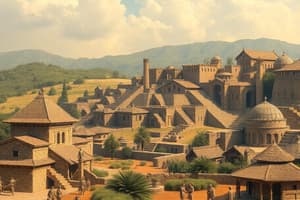Podcast
Questions and Answers
What is the primary purpose of studying history?
What is the primary purpose of studying history?
- To entertain stories about the past
- To create fictional accounts of human affairs
- To memorize names and dates of historical events
- To understand the past for informing present and future decisions (correct)
Which period is characterized by the emergence of writing?
Which period is characterized by the emergence of writing?
- Modern History
- Prehistoric Era
- Ancient History (correct)
- Medieval Period
What is the main focus of historiography?
What is the main focus of historiography?
- Studying the causes of historical events
- The examination of historical writing and methods (correct)
- Analyzing ancient artifacts
- Recording historical speeches
Which concept involves the spread of ideas, practices, and technologies across cultures?
Which concept involves the spread of ideas, practices, and technologies across cultures?
Which of the following figures is known for leading the Indian independence movement through nonviolent civil disobedience?
Which of the following figures is known for leading the Indian independence movement through nonviolent civil disobedience?
What significant global event began around the 1800s?
What significant global event began around the 1800s?
Which methodological approach examines human history through excavating sites?
Which methodological approach examines human history through excavating sites?
Which theme in history relates to movements for civil rights and social reform?
Which theme in history relates to movements for civil rights and social reform?
Flashcards are hidden until you start studying
Study Notes
Overview of History
- Definition: The study of past events, particularly in human affairs.
- Purpose: Understanding the past to inform the present and future decisions.
Major Periods in History
-
Prehistoric Era
- Time before written records.
- Includes the Stone Age, Bronze Age, and Iron Age.
-
Ancient History (c. 3000 BCE - 500 CE)
- Emergence of writing and early civilizations (e.g., Mesopotamia, Ancient Egypt, Indus Valley).
- Development of empires (e.g., Roman Empire, Persian Empire).
-
Medieval Period (c. 500 - 1500 CE)
- Feudalism in Europe.
- Rise of Islamic caliphates and the Byzantine Empire.
- Cultural and intellectual movements (e.g., Scholasticism).
-
Early Modern Period (c. 1500 - 1800 CE)
- Renaissance and Reformation.
- Age of Exploration and colonization.
- Rise of nation-states.
-
Modern History (c. 1800 - Present)
- Industrial Revolution and its global impact.
- World Wars I and II.
- Cold War and globalization.
Key Historical Concepts
- Chronology: Arrangement of events in their order of occurrence.
- Historiography: Study of historical writing and methods.
- Primary vs. Secondary Sources:
- Primary: Original documents, artifacts.
- Secondary: Analyses, interpretations of primary sources.
Important Themes in History
- Cultural Exchange: Spread of ideas, practices, and technologies across cultures.
- Conflict and Cooperation: Wars, treaties, alliances, and their impacts.
- Social Change: Movements for civil rights, social justice, and reform.
Influential Historical Figures
- Alexander the Great: Conqueror who created one of the largest empires.
- Julius Caesar: Roman general and statesman, pivotal in the rise of the Roman Empire.
- Mahatma Gandhi: Leader of the Indian independence movement through nonviolent civil disobedience.
Methodologies in Historical Research
- Archaeology: Study of human history through excavating sites.
- Anthropology: Examines human societies and cultural development.
- Documentary Analysis: Critical examination of written records.
Importance of Studying History
- Understanding Context: Provides insight into current events and societal structures.
- Learning from Mistakes: Helps avoid past errors in governance, conflict, and society.
- Civic Awareness: Fosters informed citizenship and participation in democracy.
Overview of History
- Focuses on past events, especially in human affairs.
- Aims to enhance understanding of present and future decisions.
Major Periods in History
-
Prehistoric Era
- Represents time before written records.
- Includes significant ages: Stone Age, Bronze Age, Iron Age.
-
Ancient History (c. 3000 BCE - 500 CE)
- Marked by the emergence of writing and early civilizations such as Mesopotamia, Ancient Egypt, and the Indus Valley.
- Development of large empires, notably the Roman and Persian Empires.
-
Medieval Period (c. 500 - 1500 CE)
- Characterized by the feudal system in Europe.
- Rise of Islamic caliphates and the Byzantine Empire.
- Important cultural movements, including Scholasticism.
-
Early Modern Period (c. 1500 - 1800 CE)
- Notable for the Renaissance and Reformation.
- Age of Exploration led to global colonization.
- Emergence and consolidation of nation-states.
-
Modern History (c. 1800 - Present)
- Industrial Revolution brought transformative global changes.
- Major conflicts including World Wars I and II.
- Cold War era and the advent of globalization.
Key Historical Concepts
-
Chronology
- Organizing historical events according to their occurrence.
-
Historiography
- Analysis of how history is written and the various methodologies involved.
-
Primary vs. Secondary Sources
- Primary sources are original documents and artifacts.
- Secondary sources include analyses and interpretations of primary sources.
Important Themes in History
-
Cultural Exchange
- Involves the dissemination of ideas, practices, and technologies among different cultures.
-
Conflict and Cooperation
- Examines the dynamics of wars, treaties, alliances, and their effects on societies.
-
Social Change
- Focuses on movements advocating for civil rights, social justice, and reforms.
Influential Historical Figures
-
Alexander the Great
- Known for creating one of history's largest empires through conquest.
-
Julius Caesar
- A crucial figure in the transformation of the Roman Republic into the Roman Empire.
-
Mahatma Gandhi
- Led the Indian independence movement using principles of nonviolent civil disobedience.
Methodologies in Historical Research
-
Archaeology
- Involves interpreting human history through the excavation of historical sites.
-
Anthropology
- Studies human societies and cultural developments over time.
-
Documentary Analysis
- Entails critically examining written records to understand historical contexts.
Importance of Studying History
-
Understanding Context
- Provides valuable insights into contemporary events and societal constructs.
-
Learning from Mistakes
- Historical study aids in recognizing and avoiding previous errors in governance and conflict.
-
Civic Awareness
- Encourages informed citizenship and active participation in democratic processes.
Studying That Suits You
Use AI to generate personalized quizzes and flashcards to suit your learning preferences.



